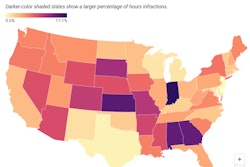Trucking news and briefs for Tuesday, April 29, 2025:
House Transportation budget proposal would create new carrier authorization confirmation website
As House Republicans this week begin the budget reconciliation process, the House Transportation & Infrastructure Committee has published its proposal that calls for a public website to confirm motor carriers’ operating authority, a requirement for electric vehicles to pay into the Highway Trust Fund and other measures.
“With this proposal, the Committee is doing its part to ensure that Republicans fulfill our promise to the American people and the promise of the President’s America First agenda,” said Committee Chairman Sam Graves (R-Missouri).
Budget reconciliation is an expedited process Congress can use to make legislation easier to pass in the Senate by requiring a simple majority vote rather than needing 60 votes. During the reconciliation process, certain committees are instructed to submit recommendations for spending and/or revenue changes to the Budget Committee, where separate proposals are packaged together into one bill.
The T&I Committee’s proposal would allocate $5 million to the Federal Motor Carrier Safety Administration to establish a public website that provides information on motor carriers “in a manner that indicates whether each motor carrier meets or does not meet all [FMCSA] operating requirements.”

For each carrier, the site would display one of two statements:
- “This motor carrier meets Federal Motor Carrier Safety Administration operating requirements and is authorized to operate on the nation’s roadways.”
- “This motor carrier does not meet Federal Motor Carrier Safety Administration operating requirements and is not authorized to operate on the nation’s roadways.”
The provision also would require an annual $100 fee for each person seeking access to the website.
According to the T&I proposal, any “broker, freight forwarder, or household goods freight forwarder” that uses the site to ensure the carrier they’re working with “meets Federal Motor Carrier Safety Administration operating requirements shall be considered to have taken reasonable and prudent determinations in engaging such motor carrier.”
The proposed website appears to be an answer to a request long-sought by the Transportation Intermediaries Association to create a “national hiring standard” that would require brokers and freight forwarders, prior to contracting with a motor carrier, to ensure the operating authority of the carrier. For brokers and freight forwarders, this would help absolve them of liability in the case of a crash and ensuing litigation.
It could also help solve the “Conditional” safety rating limbo that many small carriers find themselves in, essentially creating a “Fit or Unfit” rating system.
[Related: Fit or Unfit? FMCSA keying in on problems with 'Conditional' safety rating limbo]
T&I's proposal also includes provisions for investments into the U.S. Coast Guard, America’s air traffic control system and other transport sectors. It also proposes to rescind certain Inflation Reduction Act funding programs and proposes to require owners of electric vehicles to begin paying into the Highway Trust Fund through increased registration fees, given EVs don’t pay fuel taxes like regular vehicles. Electric farm vehicles and commercial motor vehicles generally are excluded from that provision.
Graves said the proposal ensures “that electric vehicles begin paying their share for their use of the nation’s highways. It’s only fair that EVs pay these user fees like other motorists. In fact, the new user fees provision addresses the broken Highway Trust Fund revenue stream in a substantial manner for the first time in over 30 years.”
[Related: Congress floats bill to make EV cars pay road upkeep fair share]
T&I is slated to hold its markup on the proposal Wednesday, April 30. Should the trucking-related provision remain in the bill, it will need to survive both a full House and Senate vote to become a reality.
High school’s petition to allow 17-year-old CLP holders denied
The Federal Motor Carrier Safety Administration has denied an exemption request from a high school in Washington state that sought to allow 17-year-olds to obtain commercial learner’s permits (CLPs).
Last year, Connell High School in Connell, Washington, which offers a CDL program for students, petitioned FMCSA for the exemption to allow students enrolled in its CDL Training Program to obtain a CLP at the age of 17. The program would span two semesters (one full school year) and provide 180 hours of classroom, field, and drive time training.
In its request, the high school said that it believed the exemption would allow students to obtain a CDL at 18 and, upon graduation, “immediately enter the local workforce with stable, well-paying employment.”
FMCSA received 32 comments on the request with 17 opposed and 15 supporting. “All of the supporting comments were from individuals,” FMCSA noted. “Of the comments in support, a majority believed that individuals in the program would be successful with the proper training.”
Of the 17 comments opposing the request, two were from trucking companies. Most of the commentary in opposition felt “the students were too young and lacked the appropriate experience to operate a CMV,” FMCSA said.
In denying the request, FMCSA said that based on the information provided by the school and commenters, it did not have enough information to determine if granting the exemption would “achieve a level of safety equivalent to, or greater than, the level obtained by complying with the regulation.”
[Related: FMCSA petitioned to allow CLPs for 17-year-olds]
FMCSA denies ELDT regs waiver for prospective driver trainer
A prospective CDL training instructor’s exemption request from certain provisions of FMCSA’s Entry-Level Driver Training (ELDT) regulations has been denied.
Albert Farley Jr. in December requested an exemption from the requirement that instructors have at least two years of driving experience of the same or higher class and/or the same endorsement level as the CMV to be operated to satisfy the instructor requirements under the ELDT regulations.
FMCSA acknowledged that Farley wants to be a behind-the-wheel CMV instructor for students seeking Class A CDLs, but noted that even though he held a Class B CDL and operated Class B CMVs “for many years, he does not have two years of experience operating Class A vehicles.”
“The Agency firmly believes that allowing an individual instructor to provide ELDT without the required driving experience could lead to similar exemption requests on a widespread basis,” FMCSA added. “Such a result would be inconsistent with a primary goal of the ELDT regulations, which was to improve highway safety by establishing a uniform Federal minimum ELDT standard.”
[Related: CDL schools call out 'threat' of 'unscrupulous training entities']










